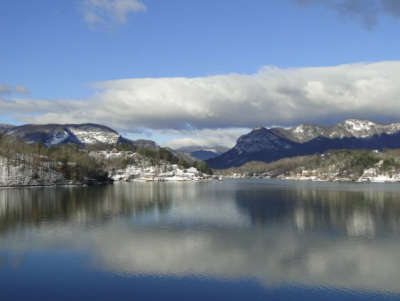Recommendations for Winter Preparations
When winter is approaching, then remember that good wet snow will bring down the weaker trees in our area that may be intertwined with power lines causing several concerns. First, this closes roads, sometimes for quite a while, depending on how many trees come down at once and how many have power lines in them. Most of you probably know that our firefighters, public works and North Carolina Department of Transportation (NCDOT) get out and cut down trees on the roadways regularly; however, if power lines are tangled with the tree, then we must wait for the power company to ensure the power is off before cutting the tree. This wait can be from one hour to several hours, depending on conditions.
The main issue with power outages is that many people are not prepared to be without power for an extended period of time, from hours to days. These conditions heavily tax our volunteer firefighters as we open and run shelters, transport people to shelters, check on the elderly and carry supplies to people who were unprepared. This is in addition to responding to motor vehicle accidents, increased medical emergencies, and, unfortunately to fires.
During and after a Winter Storm:
- Conserve heating fuel by shutting off unused rooms.
- Wear several layers of clothing and a hat outdoors. Cover your mouth with a scarf to protect your lungs.
- Don't overextend yourself while shoveling snow.
- Watch for signs of frostbite: loss of feeling along with paleness in the tip of the nose, fingers, toes, and ear lobes.
- Beware of hypothermia. Signs include uncontrollable shivering, slurred speech, drowsiness, memory loss, and disorientation.
- Avoid driving at night or alone. Notify others of your schedule and route.
North Carolina Emergency Management strongly encourages people to be prepared to be in their homes for 72 hours without power. This is really quite simple but requires some planning.
- First, you must have a backup source of heat such as gas logs, a wood stove, or other approved indoor heat that does not require electricity to operate.
- Use caution and only use heating devices designed for indoor heating; portable kerosene heaters are not designed to be used in unventilated areas.
- People suffer from carbon monoxide poisoning every year from using these kerosene heaters indoors and not properly using their generators. Maintain appropriate separation between your home and the generator and always follow manufacturers instructions on usage.
- Make sure you have properly working battery operated smoke and carbon monoxide alarms (CO) with back up batteries.
- Next, you need sufficient food and water stored for each member of your family for 72 hours, also remember that you will need a manual can opener for those ready-to-eat canned foods.
- Water should not be stored in empty milk jugs because bacteria can still be in the jug even after washing; you will need at least a gallon of water per day per person.
- Another tip is to fill your tub with water when they’re calling for a winter storm, and you can use this water to flush the commode, etc.
- Other important items are a supply of your medications, flashlights, batteries, battery-operated radio, first aid kit, blankets, and baby supplies if you have a baby in the house.
- If you use oxygen, ensure that you have additional oxygen cylinders in your home.
- A cell phone can be helpful, but make sure your batteries are charged. If you do need help, then do not hesitate to call 911, and remember it will take us longer than normal to get there, so don’t wait if you know you’re going to need help; call us while you have some time. If you need to go to a shelter, then bring your supplies with you, especially your medications.
We open emergency shelters when needed and will be glad to assist you if you have a problem. The emergency shelters are equipped with backup generators and are run by the local fire departments and the American Red Cross.
Driving in snow and ice is always dangerous, and our roads do not help; therefore, our best advice is not to drive unless you have to. If you have questions or would like a brochure on preparing for severe weather, then contact us at 828-625-9333.
REGISTER FOR EVERBRIDGE - EMERGENCY NOTIFICATIONS
Be sure to register for the Town of Lake Lure, NC's Emergency Notification System (Everbridge) to receive important updates. You may opt to receive notifications by text message, phone call, or email. Please click on the following link to register: https://member.everbridge.net/305943405396052/login
Questions: For questions or assistance with your registration you may email Communications@townoflakelure.com.


